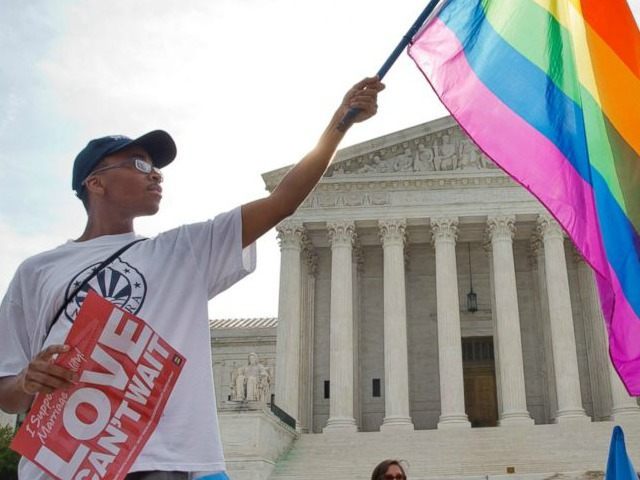The Supreme Court is denying a Kentucky county clerk’s application to stay a lower court’s ruling that she must begin issuing marriage licenses to same-sex couples. While government officers have religious liberty rights, some question whether the stronger legal argument would be to claim a personal religious liberty right to object to same-sex marriage, but not to claim governmental authority to ban her deputies from issuing those licenses, either.
By a single vote, three months ago the Supreme Court declared a constitutional right to same-sex marriage. Breitbart News reported on July 9 that Kim Davis, the elected clerk of Rowan County, Kentucky, refuses to issue marriage licenses to homosexual couples. Several people sued. Then on August 14, we reported that a federal district judge in Kentucky ordered Davis to begin issuing the licenses, that she refused to do so, and that she risked contempt of court.
Now things have reached a turning point. Davis’s lawyers asked the U.S. Court of Appeals for the Sixth Circuit to grant a stay of the district court’s order while her appeal is ongoing, but the Cincinnati-based appellate court denied the stay. Davis’s lawyers then filed an emergency application with Justice Elena Kagan, who supervises the Sixth Circuit, to grant the stay.
Although Kagan could have acted on her own, she referred the application to the full Supreme Court, as is often done in high-profile cases without clear precedent. Then on August 31, all nine justices—including the four who dissented from the Court’s creating a constitutional right to same-sex marriage—denied the stay with a one-sentence order.
This is not the end of the case. It now proceeds in the lower courts, where Davis can take the district court’s final judgment to the Sixth Circuit, and after that can petition the Supreme Court a second time—except that time it would be petitioning for a writ of certiorari for the Court to hear the merits of her case. Emergency stays from the Supreme Court are very rare, with one of the factors being the justices’ view on the likelihood that they will eventually grant review of the case.
What sets Davis apart from many of the other religious-liberty cases involving government officers on this issue is that while other officials are asking to be exempted from using their public office to participate in something with which they disagree, Davis is asking to use the powers of her office. In many cases with conscientious objectors—such as many county officials in Texas—the religiously motivated government officer wishes to recuse himself from issuing marriage licenses, in which case one of his deputies serving in that office can issue the certificate in the same manner as if the chief official were ill that day.
Here, by contrast, Davis has gone beyond saying she will not issue marriage licenses, and instead has ordered her subordinates that they are not going to issue licenses either, because Davis’s name is printed on those licenses. Many legal experts suggest that her odds of success are slim, in that she is both claiming a personal right based on her religious belief, but then also claims the right to use her governmental power to order other civil service to act only as she acts, even if they do not share her religious objection.
A parallel from the military illustrates this principle. Ever since the founding of the republic, the U.S. military has allowed those who religiously object to the use of deadly force to be assigned to noncombatant roles in the military so that they never have to pick up a weapon. These conscientious-objector accommodations are rooted in every American’s fundamental rights secured by the First Amendment of the Constitution.
Here, however, the parallel would be if a conscientious objector were nonetheless assigned as an officer in command of an infantry unit, and then that officer ordered all the troops under his command to set aside their weapons and refuse to fight, just like their commander. The officer would be using the authority that he holds only by virtue of his office—and thus power that does not belong to him personally, but rather belongs only to the office he currently holds—to assert a personal right based on his personal religious beliefs.
That is a much steeper hill to climb in court, but Kim Davis will get her day in court to make her case. The more immediate question will be whether her actions over the next few days escalate the situation further.
Regardless of the outcome in Davis’s case, many other cases are now in the courts, involving purely private citizens, who are being sued or losing their jobs because of their purely private beliefs on marriage, or those in uniform being told that they cannot hold their religious beliefs and still serve in the military. America is in uncharted waters as to what will come next, but one thing that is clear is that millions of observant people of faith will not sacrifice their sincere beliefs based on a court ruling, and are willing to pay the price if needs be.
Ken Klukowski is legal editor for Breitbart News and senior counsel with Liberty Institute. Follow him on Twitter @kenklukowski.

COMMENTS
Please let us know if you're having issues with commenting.